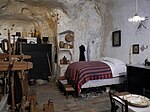Sassi Di Matera
The "Sassi" have been described by Fodor's as "one of the most unique landscapes in Europe". Along with the park of the Rupestrian Churches, it was named a World Heritage Site by UNESCO in 1993.
History
The Sassi originate from a prehistoric troglodyte settlement and are suspected to be among the first human settlements in Italy. There is evidence that people were living here as early as the year 7000 BC.
The Sassi are houses dug into the calcarenitic rock itself, which is characteristic of Basilicata and Apulia, locally called "tufo" although it is not volcanic tuff or tufa. The streets in some parts of the Sassi often run on top of other houses. The ancient town grew up on one slope of the ravine created by the Gravina river. The ravine is known locally as "la Gravina".
The term sasso derives from Latin saxum, meaning a hill, rock or great stone.
In the 1950s, the government of Italy forcefully relocated most of the population of the Sassi to areas of the developing modern city. Beset by extreme poverty and riddled with malaria, the unhealthy living conditions were considered inhuman and an affront to the modern new Italian Republic of Alcide De Gasperi. However, people continued to live in the Sassi, and according to the English Fodor's guide:
Matera is the only place in the world where people can boast to be still living in the same houses of their ancestors of 9,000 years ago.
Until the late 1980s this was considered an area of poverty, since many of these houses were, and in some cases still are, uninhabitable. The current local administration, however, has become more tourism-oriented, and it has promoted the regeneration of the Sassi with the aid of the European Union, the government, and UNESCO. Today there are many thriving businesses, pubs, and hotels there, as described in an April 2015 article in The New Yorker.

Geography
The "Sassi" grew in the area of Murgia Plateau, extended between Apulia and Basilicata. Along with the "Civita" and the "Piano", the two Sassi form Matera's Old Town.
Culture

The Sassi are visually reminiscent of ancient sites in and around Jerusalem, and for this reason they have been used in many Christian-themed films, including The Gospel According to St. Matthew (Pier Paolo Pasolini, 1964), The Passion of the Christ (Mel Gibson, 2004), The Nativity Story (Catherine Hardwicke, 2006) and Ben-Hur (Timur Bekmambetov, 2016).
The Sassi di Matera serves as a critical clue in Dick Rosano's mystery, 'The Secret of Altamura.' They also appeared in Patty Jenkins's Wonder Woman (2017), serving as a location for the Amazons' city Themyscira, and Cary Joji Fukunaga's No Time to Die (2021), where a scene with James Bond's Aston Martin racing through was shot.
Music
in 2016 the band Corde Oblique released a song, "I sassi di Matera", on the album "I Maestri del Colore". The song is divided into two parts, the first inspired by the so-called Sasso Barisano, and the second by the Sasso Caveoso.
Gallery
-
Sasso Barisano
-
Sasso Caveoso
-
Church of St. Pietro Caveoso
-
View from the hills
-
Interior of a cave house
See also
- Murgia
- Falco naumanni
- Museo-laboratorio della Civiltà Contadina (Museum-workshop of the Peasant Culture)
References
- ^ Fodor's Southern Italy, Fodor's Travel, 22 March 2011
- ^ "People Still Live in These Ancient Cave Houses in Italy". Atlas Obscura. Retrieved 2022-07-13.
- ^ Morris, John (5 January 1880). "The new nation" – via Google Books.
- ^ Dennis Marks, speaking on the series Appian Way, BBC Radio 3
- ^ "A Cave with a View". The New Yorker.
- ^ "Info about the Murgia Plateau". Archived from the original on July 22, 2011.
- ^ "Sassi of Matera: what to know and what to visit".
- ^ "Matera's live nativity draws 30,000". ANSA. 6 January 2015. Retrieved 17 November 2016.
- ^ "Wonder Woman Island of Themyscira: Where was Wonder Woman filmed?". atlasofwonders.com. Retrieved 27 September 2017.
- ^ "James Bond starts filming in Matera". ilglobo.com.au. 27 August 2019. Retrieved 23 December 2019.






